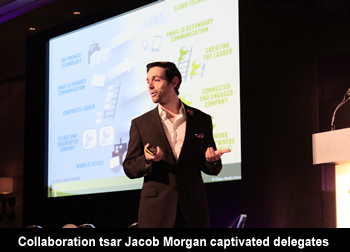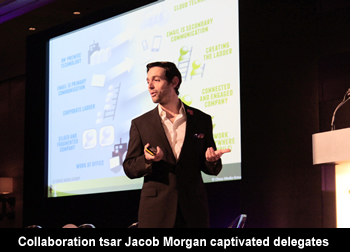 Putting a finger on the pulse of megatrends driving Enterprise IT 3.0 and Industry 4.0 are top of the agenda at this year's Comms Vision Convention, writes Content Director John Chapman.
Putting a finger on the pulse of megatrends driving Enterprise IT 3.0 and Industry 4.0 are top of the agenda at this year's Comms Vision Convention, writes Content Director John Chapman.
For the last nine years Comms Vision has provided the platform for industry and business experts to air their views and pass on their wisdom about the future of the comms industry and its relevance to the broader economic development of our country. This is why Comms Vision is a magnet for CEOs and senior managers of comms channel companies who gain not only the opportunity to listen to eminent speakers on important topics but also the chance to debate and discuss issues with their peers across the industry. Comms Vision 2014 will again be the highlight of the year for these important decision makers and strategists from the comms channel as we expand on our theme of 'Digitalisation - driving new enterprise and industry business models'.
The reason we are using the term Digitalisation in our theme this year is because it is what industry and business thinkers are using to describe a broad change that is happening around business structures and organisations resulting from the influence of IT and communications technologies. For once it is not the technologists coming up with another buzzword, rather business analysts trying to put a name to a phenomena that is rapidly changing the way enterprise and industry structures their operations and activities to maximise the opportunities that advancements in IT and communications technologies and services offers them.
Digitalisation is leading organisations to rethink business concepts, models and structures in such a fundamental way that many business analysts are viewing the phenomena as a new era for IT and a new paradigm for industry. This has led to the terms Enterprise IT 3.0 and Industry 4.0 as a way of describing what is happening and its importance.
 Enterprise IT 3.0 describes the third era of IT. The first being where IT was a specialisation focused on technology solving specific problems and the second being the industrialisation of IT based around processes, solutions, efficiency and effectiveness. This third era of IT, based around Digitalisation, is now all about supporting business models and enabling organisations to innovate and create new types of value around the data they hold.
Enterprise IT 3.0 describes the third era of IT. The first being where IT was a specialisation focused on technology solving specific problems and the second being the industrialisation of IT based around processes, solutions, efficiency and effectiveness. This third era of IT, based around Digitalisation, is now all about supporting business models and enabling organisations to innovate and create new types of value around the data they hold.
Industry 4.0, or the fourth industrial revolution, is a term supported by many governmental and industry bodies across Europe to explain the way Digitalisation and technologies such as embedded IT, Internet of Things, Big Data, Analytics and ubiquitous communications are changing not only production processes but also the industrial ecosystem.
This Digitalisation of business and industry is not just happening because of the more obvious issues we often discuss around mobility, the cloud and the web but because there are fundamental underlining technology and IT industry trends driving the demand for ITC to support and catalyse business innovation.
In our first open session at Comms Vision we will explore these Megatrends and debate the extent to which they will shape the Digitalisation of business. Topics we will cover will include Software Defined Everything - making IT more responsive, Internet of Everything - the rise of embedded intelligence, Cloud/Hybrid IT & Managed Services - changing the way IT is delivered and, A new dawn for Telcos -less infrastructure more services.
Fundamentally, however, it is not these technology megatrends that are most important as Martyn Etherington, CMO, Mitel explains: "The biggest megatrend missing from Digitalisation is from a customer perspective. People have changed the way they buy, we have to change the way we sell. In 2013, the Sales Benchmark Index published research that found typical customers complete 70 per cent of their buying journey before contacting a supplier. The buyers' journey starting point, or where the buyers due diligence begins, is on the web and at something called the Zero Moment of Truth.
"Typically they will begin this journey by typing a key word, phrase or sentence into google or a search engine of their choice. This fundamental shift in behaviour is the result of a new breed of buyer. The new buyer is well informed, technology enabled, saturated with media, and suffering from information overload. As a result, he/she does not have the time or the desire to meet with sales people. Therefore, they self-direct their educational process in search of a solution to their problem."
With this issue in mind our second open session at Comms Vision will explore within Enterprise IT 3.0 who we will be selling to now and how the channel needs to change its approach. Many are forecasting that by 2016 the CMO will control more of the IT spend than the CIO as businesses look for IT to deliver competitive advantage. In this second open session we will explore how organisations are looking to IT to transform their operations and business models and how this will require a rethink on how the channel engages with their customers.
Etherington points out some fundamental changes that the channel needs to be aware of: "What can we do to influence the new buyer? Social selling is the practice of leveraging social networks and the associated tools within the sales function, from lead generation, to closed deal, to account management. Furthermore, social media provides salespeople the ability to engage with future customers directly without picking up the phone.
"This isn't a setback but an opportunity for salespeople and buyers. Salespeople have the tools and access to truly understand buyer needs, deliver relevant and compelling messages, find real opportunities from motivated buyers and create more meaningful one-to-one relationships with customers. People have changed the way they buy, are you changing the way you sell?"
Marc Timmermans, Director Portfolio Development, Strategy & Portfolio at BT Wholesale, also believes that Digitalisation is changing the way the channel needs to talk to the customer. "Organisations have realised that everything they have now has a value and they are all looking at how to utilise that to make money and change and evolve their business. If you cannot explain how you can assist them to exploit their assets and evolve their business then you will get little joy. Unless you can explain your business value to the customer you will also have no differentiation and will only be able to compete on price."
Our third open session at Comms Vision will explore the Digitalisation phenomena as it relates to the Unified Communications and Collaboration marketplace, particularly as we now exist in a Hybrid IT world encompassing not only on-premise systems but hosted and public and private clouds. Within this session we will discuss the future of the PBX in a hybrid IT world, how collaboration is more than just video conferencing, how we educate and focus the sales and marketing teams and how the channel needs to convince customers that UC&C can be the catalyst for innovation in a digitalised world.
Our final session will explore the structure of channel relationships in this new digitalised IT world. The channel needs to become more knowledgeable, educated and capable in order to evolve and harness the business potential of our megatrends. The impact of these core trends on the channel is already being felt, but can traditional channel structures effectively harness these tech-trends and service the new breed of ICT leaders and technology buyers?
No one supplier can deliver the total solution, so where does the comms channel go to help them educate their staff and market their solutions? Does the channel have to be more independent and less reliant on their major vendor partners, or is there a new channel model emerging that is creating a greater interdependence between traditional vendors, service providers and the channel. If so what does this new channel model look like and who is driving the change?
Pete Tomlinson, Product, Marketing and Sales Director at Eclipse, has some pertinent views on why the channel needs to evolve. "These market trends are so strong that it is not just the channel that needs to change," he commented. "Within Eclipse we have moved a long way from the pure broadband provider of old. We now offer managed services, hosted applications and services as well as a range of connectivity services, and most recently we launched the first wave of our cloud based services.
"It is no longer possible to be just a comms supplier in this digitalised and Hybrid IT world, the interdependence of all these services to the overall solution requires a more integrated approach. That is why we now offer this broader range of services to our partners."
Sara Hellon, Director Channel Marketing, International Markets at Mitel, sees education as key to success in this Digitalised and hybrid IT world. "There are fundamental changes happening at a technology and business model level but most importantly from a buyers' perspective. The channel needs to embrace the new 'Voice of the Customer' and Mitel is committed to educating and working with our channel partners to understand the implications and maximise the huge business potential.
"Comms Vision provides channel executives the ideal opportunity to understand the wider world they operate in and the challenges that brings. Through the open sessions, boardroom sessions and peer to peer networking it gives our executives a special forum to engage with our channel partners and understand better how we can help them meet their business challenges."
Comms Vision looks forward to welcoming delegates to what is expected to be the liveliest and most challenging event so far. To register your interest in attending the conference, please visit: www.commsvision.com
